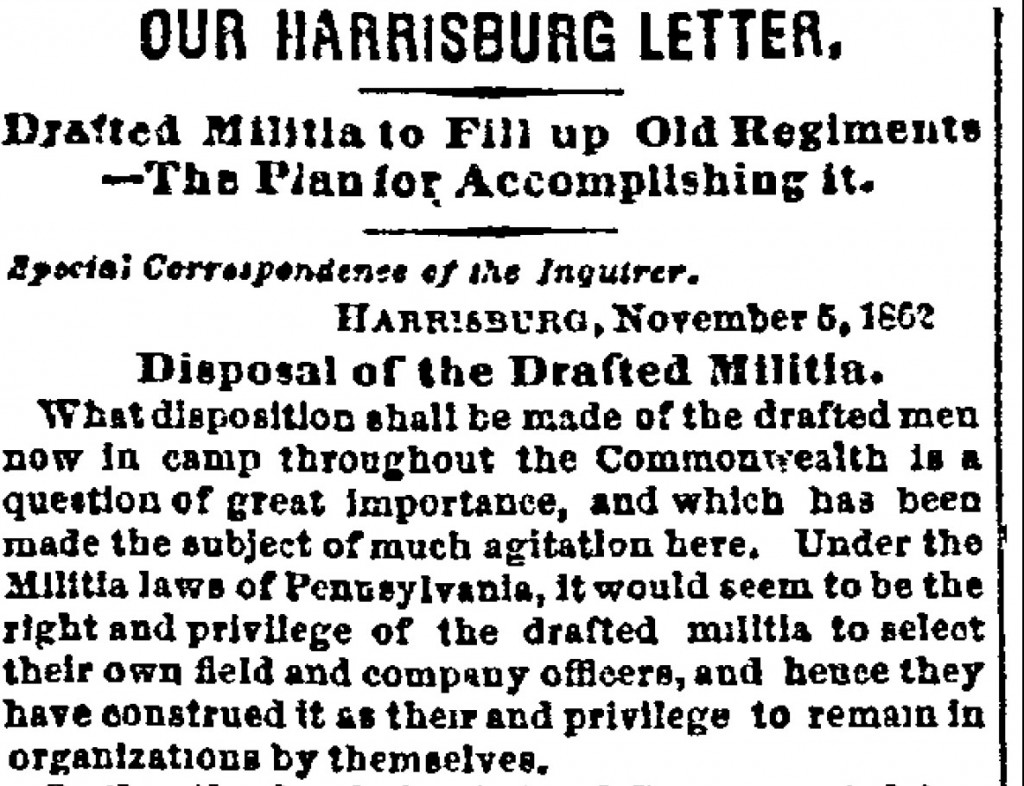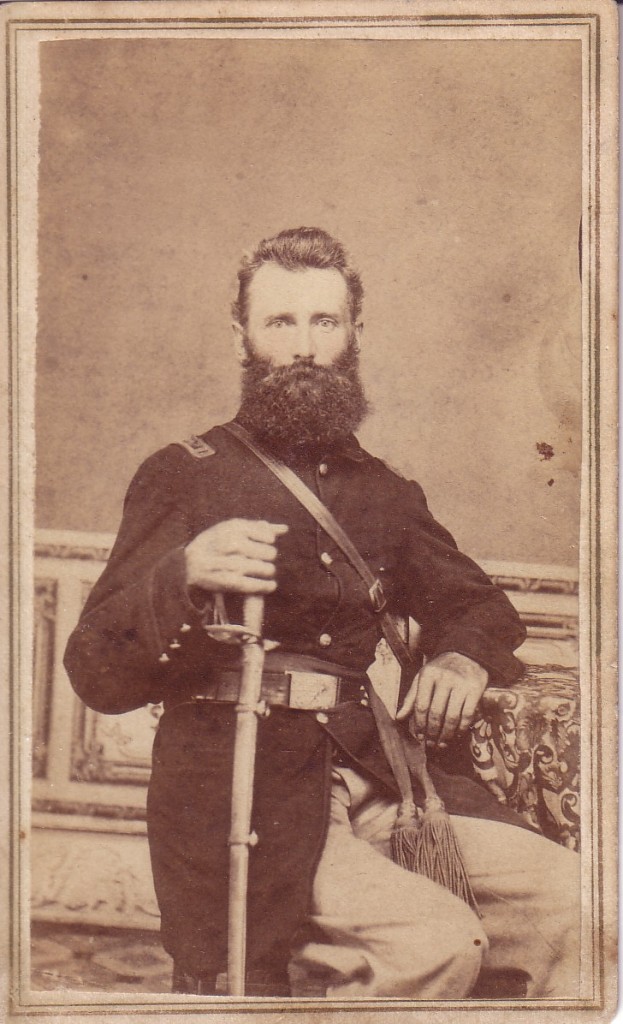Pennsylvania Drafted Militia & the Draft of 1862
Posted By Norman Gasbarro on December 6, 2010
At the start of the Civil War in April, 1861, there was great enthusiasm and support in many places in the north. President Abraham Lincoln’s call for 75,000 volunteers was answered and it appeared that these men would be sufficient to end the rebellion quickly; life could then go on as before. After the shocking loss in April 1861 at the 1st Battle of Bull Run, the reality set in that this would not be a short war and victory would not be easy.
So long as volunteers appeared to fill the ranks of the state regiments, a military draft did not appear to be necessary. Gov. Andrew Curtin of Pennsylvania believed well into 1862 that volunteers would supply the state quotas. But by October 1862 a limited draft had to take place in Pennsylvania. The names of drafted men were drawn from a large pool of those who were eligible..
Now, the question occurred of what to do with all the drafted men in the camps throughout Pennsylvania. A decision had to be made that preserved the rights of the men while meeting the needs of Pennsylvania and of the National Government. Governor Curtin, after consulting with officials in Washington, provided a solution.
The issue was discussed in the Philadelphia Inquirer on 6 November 1862.
What disposition should be made of the drafted men now in camp throughout the Commonwealth is a question of great importance, and which has been made the subject of much agitation here. Under the Militia laws of Pennsylvania, it would seem to be the right and privilege of the drafted militia to select their own field and company officers, and they have construed it as their right and privilege to remain in organizations by themselves.
On the other hand, the National Government claims the right to separate these men into squads and place them wherever desired by the military authorities. Hence some days ago, the Central Government issued an order that the drafted militia in the State of Pennsylvania should be sent to the army for the purpose of filling up the decimated ranks of the old regiments.
At this disposition to be made of them, the drafted militia her have manifested much dissatisfaction, claiming it as their indubitable right to remain in organizations of their own. They pointed to the chief magistrate of the commonwealth, on whose promise the relied, that their rights should be recognized and protected.
The Governor, in turn, manifested his desire to have these men protected in every right and privilege to which they might be just and Constitutionally entitled. Officers from the old regiments were here awaiting, with some anxiety, the decision of the authorities in regard to the disposition to be made of the drafted militia. Among them were regularly constituted authorities and agents of the United States, appointed to confer with the State authorities. Adjutant-General Thomas was one of them. They contended that the drafted militia, if placed in the old regiments, would be of greater efficiency as soldiers, would be better cared for physically, and would be in a position to win greater honor and glory for themselves, than if they remained in organizations composed entirely of their own numbers.
Both parties, however, were persistant [sic] in their claims. On the one hand the drafted militia asserted their rights, on the other, the National Government claiming jurisdiction and the right o their disposal.
For the purpose of obtaining a final understanding in reference to this subject, Governor Curtin left Harrisburg, yesterday morning, to consult with the chief authorities at Washington.
His mission excited a lively interest among the civil and military circles here. Pennsylvania wants an adequate force to protect her borders from invasion, while the enemy is near her line. This the civilians urge in favor of the drafted militia, with whom the citizens, as a general thing, sympathize.
We have now encamped along our Southern border some five thousand drafted men. In response to this order, even these men must leave the State and leave it unprotected. The old regiments could have been filled by a special draft for that purpose, which indeed, the State authorities earnestly urged. Why was it not done? Because the National authorities refused to order it. Why should the drafted militia be now required for the purpose?
The Governor returned from Washington this morning. He was besieged by an eager multitude with anxious inquiries. The result of the conference was this: – The Governor, with the Federal authorities, recognizes the necessity, which is absolute, of filling up the old regiments now in service. It must be done soon. The material must be found. It is quite evident that it cannot be done by volunteering. At least eighteen thousand men are required to fill up the Reserves. A plan was determined upon. The drafted militia have already been organized into companies, but few into regiments, with the field and company officers already appointed and selected. These men are not to be deprived of their rights. These officers are not to be deprived of their commissions, which have already been issued. Old regiment, whose ranks are decimated, will have their companies consolidated without doing injustice to the old commissioned officers. They are few in number and no new commissions have been issued in these regiments, in anticipation of some such event as this. Thus room will be made in each regiment for three or four new companies. In this room will be placed the new militia companies, with their organizations complete and unaltered.
This arrangement, it is thought, will be satisfactory, as no injustice can result therefrom.
Adjutant-General Thomas now presents his instructions, with positive orders, to fill up the old regiments with the drafted militia. Thus the matter rests. The final decision is made; there is no other appeal.
One of the newly created companies of the drafted militia elected as their Captain, Benjamin J. Evitts of the Lykens Valley. Most of the men from the company were neighbors of Evitts or knew him from the area. At about age 44, he was also older than most and knew how to read and write, seemingly a requirement for an officer!
Officially known as Company I of the 177th Pennsylvania Drafted Militia. This company was in service from 25 Nov 1862 through 5 August 1863 when it was mustered out. The photo below is believed to be of Capt. Benjamin Evitts.
After starting at Camp Curtin in Harrisburg, Dauphin Co., Pennsylvania, the 177th was sent to Washington, D.C., and from there ordered to Suffolk and assigned to the brigade under Col. Gibbs. After spending the winter in camp on the Nansemond River, in clearing a pine forest on one side of the river, and joining small expeditions in the surrounding area, they were sent to Deep Creek on the Albemarle and Chesapeake Canal to stop the contraband trade. I n July they were sent back to Washington, D.C. and following a short tour there they joined the Army of the Potomac in Maryland. Their last assignment was at Maryland Heights. They had no major engagements. [Information from The Union Army, Volume 1].
 ;
;




Comments